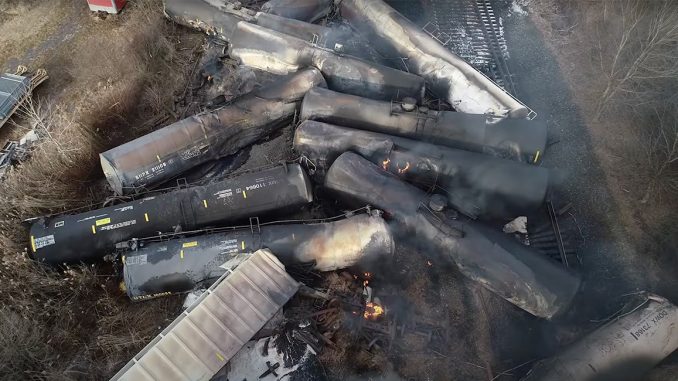
Three months ago, a failing wheel bearing caught fire on a Norfolk Southern train transporting large volumes of hazardous materials. By the time sensors alerted engineers, it was too late to avert the catastrophe that was to come.
When the wheel bearing disintegrated, dozens of train cars derailed in the heart of East Palestine, Ohio, a quintessential, small Midwestern town of just under 5,000. The cars burned for days before a so-called controlled release of the chemicals they contained was conducted to avoid a larger explosion. That release sent a fireball and plume of thick black smoke into the sky.
In all, hundreds of thousands of gallons of vinyl chloride, benzene, butyl acrylate, and other contaminants were released into East Palestine’s air, streams, and soil.
I visited East Palestine a few days later to see the damage for myself, and I was alarmed by what I found. Dozens of residents told me about the concerning medical symptoms they were experiencing, and they remain deeply worried for what the future holds. At any moment, another rural town somewhere in America may have to face the same hardship that the people of East Palestine have had to endure.
That’s why I’ve worked to advance the Railway Safety Act, a targeted bill that will significantly improve the safety standards governing America’s railroads. Its core provisions are straightforward and tailored to solve this problem.
First, trains carrying a million pounds of flammable gas should not be treated differently than trains carrying a million gallons of flammable liquid. After a disastrous event in 2013, in which a train carrying millions of gallons of crude oil derailed and caused a massive explosion, there were new regulations placed on “High-Hazard Flammable Trains.”
The events in East Palestine show there are other dangerous chemicals that make a train hazardous and flammable and that additional steps must be taken to ensure future derailments are prevented.
The second key proposal of the Railway Safety Act focuses on inspections. Reporting from The Wall Street Journal suggests railcars that were once inspected in five to eight minutes are now inspected in less than a minute. I have read internal railroad reports from 2022 that suggest the total inspection time spent examining the safety of inbound and outbound railcars has fallen dramatically. To address this problem, my bill bans maximum inspection times, which will allow railroad workers to perform the proper safety checks before these trains depart.
Finally, the bill mandates wayside bearing defect detectors for railcars. These are machines that can tell whether a wheel bearing inside of a sealed chamber is failing. The lack of these detectors was a major contributing factor to the East Palestine derailment, and improving our ability to identify wheel bearing failures before they become catastrophic will go a long way in preventing major derailments in the future.
There are other provisions in the bill—a two-man crewing requirement that exempts small railroads and allows large ones to request waivers if they need them, and a reform to the way the federal government funds emergency response training. All of these proposals are well-suited for Republicans and Democrats to come together and find common ground, and that’s exactly what we should do.
As economist Alexander Salter recently wrote in a report published by The Heritage Foundation, “The question is not whether to jettison free enterprise in favor of the common good, but how to orient free enterprise in support of the common good.”
The Railway Safety Act will introduce some commonsense changes to regulations governing America’s railroads, and in doing so, it will help this vital industry act as good stewards to the small communities gathered around its rails. That seems pretty conservative to me.
The Daily Signal publishes a variety of perspectives. Nothing written here is to be construed as representing the views of The Heritage Foundation.
Have an opinion about this article? To sound off, please email letters@DailySignal.com, and we’ll consider publishing your edited remarks in our regular “We Hear You” feature. Remember to include the URL or headline of the article plus your name and town and/or state.

